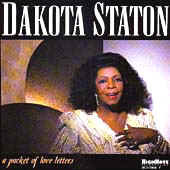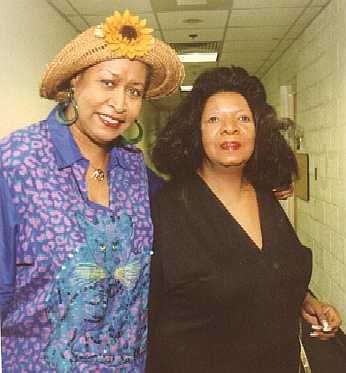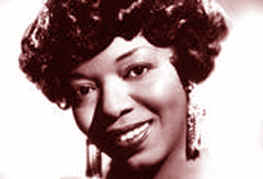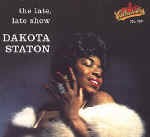


Dakota Staton was born in Pittsburgh, Pennsylvania on June 3, 1931. She knew from an early age that performing was her destiny. "When I was four years old, I started singing and dancing like Shirley Temple," she recalled in a recent interview. Staton developed her abilities at Pittsburgh’s Filion School of Music.
"When I was sixteen, I was in a stage show called Fantastic Rhythm. From that show, I was chosen to be a vocalist with the top band in the Pittsburgh area, Joe Wespray and his orchestra.
I sang with him for two years. Then I went to Detroit, Michigan, and worked in all the show bars there.." While in Detroit, Staton made a particularly strong impression at The Flame Show Bar. From there, she followed a nightclub circuit that led as far afield as Toronto and Montreal in Canada before returning stateside and passing through Indianapolis; Minneapolis; Cleveland and St. Louis before eventually winding it’s way to New York.
It was while singing in a Harlem nightclub called the Baby Grand that Staton was discovered by Capitol producer Dave Cavanaugh and signed to the label. "My first record was a single release on Capitol in 1954," she recalls. "It was called ‘What Do You Know About Love?’ and on the other side was ‘You’re My Heart’s Delight’. Staton attracted enough attention to win the prestigious Down Beat award for the most promising new comer of the year 1955. Although at this point there was still enough of an R&B tinge to her presentation to merit her inclusion, along with the likes of Big Joe Turner and Fats Domino, in fabled disc jockey Alan Freed’s first New York area Rock ‘n’ Roll party stage shows at the St. Nicholas arena, she was rapidly evolving into the dynamic, jazz based stylist whose debut Capitol album, ‘The Late, Late Show’ (1958) would quickly rise to #4 in the album charts. Staton freely admits that Dinah Washington was both a personal favorite and an important stylistic influence, and deep impression she made on Dakota is evident from the first album and throughout all her subsequent recorded work.
For her second Capitol effort, "Dynamic!’ (1958), which reached #22 in the album charts later that year, Cavanaugh turned the musical reins over to a close friend, the gifted arranger and conductor Sid Feller, with whom Staton was to enjoy a long and fruitful collaboration. Feller had arranged for Jack Teagarden’s big band before a hitch in the Army during World War II, and in 1951 he began a longtime association with Cavanaugh and Capitol records (Feller later moved on to the ABC label where he began arranging and conducting for Ray Charles, a pursuit that would occupy him for over thirty years). "I remember when Dave drove me down to a nightclub in Philadelphia to meet Dakota Staton," recalled Feller recently. "When she opened her mouth to sing and I heard that voice, I was overwhelmed. I thought she was just a marvelous singer.
She’s very underrated." "I don’t think that Dakota ever got the breaks she deserved that would’ve helped her become a major pop singer, but I know she’s always been very well respected in the jazz community." Regrettably, Feller’s assessment of Staton’s career development has the ring of truth about it. A wonderfully gifted singer with a thorough grounding in jazz, Staton was always oriented toward albums and never enjoyed the hit single that might have broadened her appeal to a larger market. This, coupled with the fact that she first arrived on the scene after the rock and roll revolution had altered the game rules of popular music forever, has to a degree robbed Dakota of the widespread name recognition she so richly deserves. (source: http://www.lentriola.com/legends/staton.htm)
In March 1998, Staton was honored as the first living legend of Gaiafest, A Celebration of Mother Earth with Women in Jazz, in Fort Lauderdale, Florida. (article)
Dakota Staton made her transition on April 10, 2007.
http://post-gazette.com/pg/07103/777638-122.stm
Dearest
Friends,
My beloved Dakota Staton died yesterday, Tuesday, April 10, at the
Isabella Nursing Home. Fred called me today and gave me the
distressing news.
I can remember when the strong, lusty, vibrant woman who loved
life and singing, had her birthday party at Cobi's Place in June
of 2000. She loved this party; she talked about it all the time.
At the time, she was booked for three major concerts in August
& September.
I can remember when in July, she was found unconscious in her
apartment, suffering from a triple aneurysm. When she awoke, she
couldn't remember anything between the party and the day they
found her.
I can remember when she was moved to the Isabella Nursing Home in September
2000.
I can remember her saying, why is it so dark in the room, when it
was sunny and bright. I can remember her losing her sight due to
glaucoma.
I can remember when we started the once a month concerts at the
Isabella with Frank Owens, Earl May and Jackie Williams (it was
Earl's idea) with Fred Staton on saxophone and Special Guest
Dakota singing a song or two, when she felt up to it. At least 5
to 10 of Dakota's singer friends, both emerging and famous, came
every month, all that way, never getting paid a cent, to sing one
song for Dakota. How they loved Dakota! And how Dakota loved them!
Gradually, Frank and his trio had to drop out, they were so busy
and so booked, so Fred assumed leadership of the quartet,
with his musician friends, and Dakota's singers continued to take
part.
These concerts were still going on, but the Isabella had reduced
our dates to one every several months. Dakota loved these
concerts; she enjoyed every one. When they brought her in a few
minutes late and she could hear them, she would declare to the
person pushing her chair: "That's my brother, Fred,
playing!"
At this time, funeral arrangements have not been completed. Will
send you information as soon as I receive it. However, artists who
knew Dakota well or performed with her, and wish to take part in
the musical portion of the services are urged to get in touch with
Fred Staton at 718/549-3621.
I weep for our loss. I will miss her, both as a person and as one
of the great singers of all time. Blind for seven years, wracked
with pain from arthritis, and gradually losing contact with us,
I'm sure that as she passed, she gave a great sigh of relief.
Love,
Cob

.jpg)


